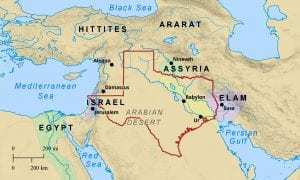Justin Taylor's Blog, page 29
November 7, 2018
How God Changes Our “Why Me?” Questions in Suffering

David Powlison:
So often the initial reaction to painful suffering is
Why me?
Why this?
Why now?
Why?
You’ve now heard God speaking with you. The real God says all these wonderful things, and does everything he says.
He comes for you, in the flesh, in Christ, into suffering, on your behalf.
He does not offer advice and perspective from afar; he steps into your significant suffering.
He will see you through, and work with you the whole way.
He will carry you even in extremis.
This reality changes the questions that rise up from your heart. That inward-turning Why me? quiets down, lifts its eyes, and begins to look around.
You turn outward and a new and wonderful question forms.
Why you?
Why you, Lord of life?
Why would you enter this world of evils?
Why would you go through loss, weakness, hardship, sorrow, and death?
Why would you do this for me, of all people?
But you did.
You did this for the joy set before you.
You did this for love.
You did this showing the glory of God in the face of Jesus Christ.
As that deeper question sinks home, you become joyously sane. The universe is no longer supremely about you. Yet you are not irrelevant. God’s story makes you just the right size. Everything counts, but the scale changes to something that makes much more sense. You face hard things. But you have already received something better which can never be taken away. And that better something will continue to work out the whole journey long.
The question generates a heartfelt response.
Bless the Lord, O my soul, and do not forget any of the good things he does, who pardons all your iniquities and heals all your diseases, who redeems your life from the pit, who crowns you with lovingkindness and compassions, who satisfies you with good things as your adornment, so that your youth is renewed like the eagle. Thank you, my Father.
You are able to give true voice to a Thank you amid all that is truly wrong, because all sins and all sufferings have now come under his lovingkindness.
Finally, you are prepared to pose—and to mean—an almost unimaginable question.
Why not me?
Why not this?
Why not now?
If in some way, your faith might serve as a three-watt night light in a very dark world, Why not me?
If your suffering shows forth the Savior of the world, Why not me?
If you have the privilege of filling up the sufferings of Christ?
If he sanctifies to you your deepest distress?
If you fear no evil?
If he bears you in his arms?
If your weakness demonstrates the power of God to save us from all that is wrong?
If your honest struggle shows other strugglers how to land on their feet?
If your life becomes a source of hope for others?
Why not me?
Of course, you don’t want to suffer, but you’ve become willing: “If it is possible, let this cup pass from me; yet not as I will, but as you will.”
Like him, your loud cries and tears will in fact be heard by the one who saves from death.
Like him, you will learn obedience through what you suffer.
Like him, you will sympathize with the weaknesses of others.
Like him, you will deal gently with the ignorant and wayward.
Like him, you will display faith to a faithless world, hope to a hopeless world, love to a loveless world, life to a dying world.
If all that God promises only comes true, then Why not me?
—David Powlison, God’s Grace in Your Suffering (Wheaton: Crossway, 2018), 115–17.
November 6, 2018
Why God’s Work in You Sometimes Hurts and Doesn’t Make Sense at First

C. S. Lewis, Mere Christianity:
Imagine yourself as a living house.
God comes in to rebuild that house.
At first, perhaps, you can understand what He is doing. He is getting the drains right and stopping the leaks in the roof and so on: you knew that those jobs needed doing and so you are not surprised.
But presently He starts knocking the house about in a way that hurts abominably and does not seem to make sense.
What on earth is He up to?
The explanation is that He is building quite a different house from the one you thought of—throwing out a new wing here, putting on an extra floor there, running up towers, making courtyards.
You thought you were going to be made into a decent little cottage: but He is building a palace.
He intends to come and live in it Himself.
November 4, 2018
Piper on the Insidious Nature of Pride in Public Life (Including the Pastorate)

From John Piper’s reflections, ten years later, on what he might say differently (or more deeply) than he did in his inaugural lecture for Bethlehem College and Seminary.
I actually began the message ten years ago with a warning about pride. This may seem gloomy. But I spent so many years in the academic world, and even more years looking at my own bent toward self-glory, that it seemed fitting to make our first act a penitent renunciation of pride.
I also wanted to make clear that academic pride comes in more than one form. Craving praise for one’s scholarly achievements is one form. But just as potent is cowardice. This is the spineless flip side of boasting.
The pride of boasting seeks praise — especially from powerful people.
The pride of cowardice seeks to avoid criticism — especially from powerful people.
I listed ten positions we take as a school that elicit criticism. This means we cannot be what we are if the pride of cowardice holds sway.
What I did not foresee ten years ago was the normalizing of proud behaviors that would once have been considered disqualifying for ministry, or at least for maturity.
This process of normalizing self-exaltation has been energized by social media.
Virtue signaling on Twitter, for example, is pervasive: “I am among the few people right now who are praying about this tragedy rather than commenting on it.” “Take note, everyone, that my heart is broken over this injustice.”
Even more blatant is retweeting other people’s praise of your book or article. When Proverbs 27:2 says, “Let another praise you, and not your own mouth,” it does not mean, “Make other people the mouthpiece of your own self-praise.”
Two other symptoms of the normalization of strutting one’s self have emerged. One is the childish antics of grown-up NFL players after they do something outstanding. The gesticulating self-congratulation would have been regarded as disgustingly immature just a few decades ago.
Finally, and perhaps most damaging of all since I spoke ten years ago, we now have a president of the United States who seems incapable of giving any evidence of humility or fallibility or interdependence.
Therefore, if I were giving that lecture today, my concerns about the insidious nature of pride in public life (including the pastorate) would be even greater, and the subtleties of its influence would need more analysis and resistance.
Read the whole thing here.
November 1, 2018
Cars, Coffee, Theology: A Conversation with Tom Schreiner

There is no karaoke. And they are not comedians. But they are thoughtful guys who like talking about life and theology. That’s the idea behind New Testament professor Jonathan Pennington’s new venture, Cars, Coffee, Theology: Caffeinated Conversations with Thoughtful People. (In addition to the website, you can follow them on Twitter (@carstheology), Facebook, and Instagram (Cars_Coffee_Theology).
The first 20-minute episode is below, with New Testament professor Tom Schreiner.
October 30, 2018
The Big and Small World of Bible Geography

David Barrett served as the cartographer for the ESV Study Bible, the Crossway ESV Bible Atlas, and the ESV Concise Bible Atlas, and the proprietor of BibleMapper.com, a map development and research tool.
I recently asked David if he would author a guest post for Between Two Worlds that would give us a reference point for the size of the Ancient Near East (that is, the world of biblical geography). — JT
As I have studied and mapped the events of Scripture over the years, I have been struck by an intriguing paradox:
The world of the Bible was at the same time very small and very large.
It’s a Small World
One the one hand, a large amount of Scripture is set within the context of the tiny land of Israel, which spanned a mere 200 miles (320 km) from north to south—roughly the size of the state of New Jersey (shown in green outline on the map below).

Even in the New Testament era, when the world was far more interconnected under the vast Roman Empire, nearly all the recorded events of Jesus’s life took place within about 65 miles of his hometown of Nazareth—a distance that could be traversed by foot in three or four days.
It’s a Big World
At the same time, it is easy to overlook just how large the world of the Bible is as well.
All too often modern people incorrectly write off the peoples of the ancient world as largely ignorant of lands and peoples beyond their own nation and the nations that immediately bordered them. We assume that these ancient peoples would not have been aware of civilizations thousands of miles away, nor would they have traveled to these lands or had regular contact with them.
Yet, a careful look at Scripture, as well as the broader historical record, speaks otherwise.
As far back as Genesis 10, in the Table of Nations, the writers of Scripture referred to places possibly as far west as Italy and as far east as Iran.
They spoke of peoples as far north as the Caucasus Mountains above the Black Sea and as far south as Sudan, Ethiopia, and Yemen.
Even Israel’s own origins are clearly spelled out as being rooted in the land of Mesopotamia, and Israel’s identity as a people was tightly bound to their deliverance from Egypt.
Likewise, every Israelite upon entering the Promised Land was to make an offering to God and personally recite how his father was “a wandering Aramean” from Ur who “went down to Egypt and sojourned there” until the Lord delivered his people (Deut. 26:5–10).
Israel itself was ideally positioned as an international travel corridor in the Ancient Near East. It controlled a section of the thin ribbon of traversable land between the great civilizations of Egypt, Anatolia, and Mesopotamia, and a prominent Arabian spice route terminated along the southern edge of Israel at Gaza for distribution throughout the Mediterranean world. David’s kingdom included most of this corridor, and Solomon extended it even further to the Euphrates River. Solomon also sent out trading ships to places essentially regarded as the ends of the earth, bringing back treasures from as far away as perhaps India. It appears that Solomon also engaged in a sort of international arms trade, buying horses and chariots from Egypt and Cilicia and selling them to the Hittites and the Arameans. These ventures, combined with his control of the trade routes, made him extremely wealthy—and apparently very famous.
The queen of Sheba, from her kingdom more than a thousand miles away in southern Arabia, personally traveled to Israel to meet Solomon and see his famed accomplishments (1 Kings 10).
The international scope of biblical events continued to grow throughout the Old Testament, as the divided kingdoms of Israel and Judah increasingly became entangled in the machinations of the superpowers of the ancient world. Many of the oracles of the Major and Minor Prophets directly address these nations or the effects they had on Israel and Judah. After Israel was exiled throughout the Assyrian empire and Judah was exiled to Babylon, the Persians came to dominate virtually all of the Ancient Near East, eventually ruling over a domain that was eight-times the size of Texas (which is shown in red outline on the map at the top of this post). This vast empire—the largest the world had ever known up to this time—was the world of Ezra, Nehemiah, Esther, Daniel, Malachi, and others.
By the time of the New Testament, the biblical world was largely dominated by the powerful Roman Empire, which ruled the entire Mediterranean world. Paul himself was a Roman citizen and traveled extensively through the empire, possibly even as far as Spain (Rom. 15:24–28), and tradition holds that most of the apostles eventually carried the good news of Jesus Christ throughout the known world, including India.
Comparing It to Our World
The more I come to understand the world of the Bible, the more I become convinced it was actually not that much different from our own world in some respects. Certainly the world has undergone great changes in technology, communication, and transportation since Bible times, yet at the same time we’re still typically enveloped by a fairly small day-to-day existence.
Most of us get up each morning and go through the same routine every day; we go to work and talk with the same people that we talk to every day; and we often face the same basic struggles month after month, year after year. Yet we would be mistaken if we were to conclude that our world really is as small as it often seems. Undoubtedly the handful of simple fishermen who followed Jesus from village to tiny village in the backwoods hills of Galilee never fully realized the future effect of their seemingly menial deeds. Yet their faithful obedience to Jesus day in and day out eventually reaped an immeasurable spiritual harvest throughout the entire world.
May each of us see ourselves the same way—living lives in a world that is both small and very, very large, for the glory of God.
October 22, 2018
Why Ben Sasse Quit Twitter for Half a Year—And What He Now Teaches His Family about Social Media

Senator Ben Sasse, author of the insightful new book, Them: Why We Hate Each Other—and How to Heal, writes about the six-month “sabbath” he took from social media and how he used it differently when he returned:
We thought long and hard at my house before I went back—and when I did, I returned with rules.
I use it only
at certain times,
for certain purposes, and—critically important—
with specific audiences primarily in mind.
If I were forced to choose between having too much and too little digital input in my life and in my kids’ lives, there is no doubt about my answer: Unplug. Life worked just fine before social media, and lots of neurobiological research makes clear that lives saturated by distracting technology are less happy. Digital addictions harm your mind, your body, and your soul.
But you don’t have to choose all-or-nothing. There is a middle way.
But only if we build guardrails against technology’s tendency to swallow everything.
Some of the rules or guardrails are relatively obvious:
Turn off most notifications and alerts.
Stop checking in on retweet counts and likes.
Read the comments on your posts only at a predetermined time (or just don’t read them).
Unfollow the politics addicts.
Have places your phone is never allowed—such as at the dinner table.
Take regular social media fasts—times of the day and days of the week where you don’t open the apps.
Constantly ask yourself: Two weeks from now, will I wish I had spent the ten minutes I’m about to spend on Twitter reading five pages of the book I’m carrying around instead (and oh, this plan requires constantly carrying a book around)?
One of my most important rules is that
I never allow any long chunk of work time to be interrupted by social media. Instead, I look at it primarily only in small, hard-to-use, backend-constrained chunks of time—boarding a flight or at the end of a workout.
These kinds of rules help restore sanity. But they’re not the whole picture. The big leap forward for our family was recognizing that living well requires the right audience. . . .
In everyday life, thinking about audience means asking:
Who’s on my mind as I go about my day?
Who am I putting in front of me?
When we’re constantly online, it means that the people who are literally, physically, in front of us—our spouse, our kids, our coworkers—are being sidelined in favor of people who are far away (some of whom we’ve probably never even met).
One of my wife’s friends looked at our life and commented:
“Someone somewhere is always dying. Does that mean you should never actually fish with your kids? Should you never throw a ball with your son, because there is a crisis somewhere that could demand a political comment?”
Her honesty hit me hard. When we prioritize “news” from afar, we’re saying that our distant-but-shallow communities are more important than our small-but-deep flesh-and-blood ones. That shouldn’t be the case. The other people in the comments section don’t love you and never will; your spouse and kids do and always will.
But often we let technology convince us that the people we should put in front of us are the people retweeting us and liking our statuses. We live richer, more fulfilled lives when we’re directing ourselves to the right people. . .
After a season of “healthy wrestling” about the dangerous ways that social media tries to pull us from the communities they care most about, the Sasses put a list of 16 truths on their refrigerator. “It’s neither complete nor fancy, but our growing list is a way for our family, together, to make progress thinking about the duties we do and don’t have to digital communities versus real ones.
Here it is:
Digital Time, Real Friends, & What We Care About . . .
1. Your thousandth social media friend won’t make you any happier. Your fourth real friend will.
2. Uninterrupted time is life’s most valuable limited resource.
3. Most news isn’t news.
4. Envy isn’t good therapy. Rage isn’t good therapy. Working out is good therapy.
5. Do something now you’ll want to talk about at the dinner table tonight.
6. Political addicts are weird. (And there aren’t that many of them. They’re just loud.)
7A. I’d rather be with the people I’m with right now than with the people I’m not with.
7B. If #7A isn’t true, then spend more time with the right people.
8. Develop the right addictions. (Another word for addictions is habits. Habits determine character.)
9. Not every bad thing in the world requires a response from you.
10. Not every mean thing said to you requires you to acknowledge it.
11. You’re not omniscient. Don’t assume your bubble of information is the whole story.
12. You’re not omnipotent. Taking in bad news you can’t do anything about doesn’t help anyone.
13. Sports Twitter is infinitely better than political Twitter.
14. Lots more social media is fake bots than social media companies admit.
15. The little old lady on your block probably has an important unmet need today.
16. Social media isn’t great for deep stuff. It’s great for humor. Let’s be known as a family that laughs hard.
October 18, 2018
Is a Miracle a Violation of the Laws of Nature?

We sometimes hear—from Christian and atheist alike—that miracles are violations of the laws of nature. But that is to misunderstand what we mean by the “law of nature.”
Today, we understand natural law to serve essentially as description rather than prescription. Though we call them “laws,” they are not so in a rigid and prescriptive sense. Rather, they are universal inductive generalizations. If so, then it would be a logical impossibility to “violate” a true law of nature.
Philosopher of religion Wiliam Lane Craig offers a popular-level elaboration:
The laws of nature describe what would happen in a particular case assuming that there are no intervening supernatural factors.
They have . . . ceteris paribus clauses implicit in them—namely, all things being equal, this is what will happen in this situation.
But if all things are not equal, the law isn’t violated.
Rather, the law just doesn’t apply to that situation because there are other factors at work.
In the case of a miracle, God doesn’t violate the laws of nature when he does a miracle.
Rather, there will be causal factors at work, namely God, which are supernatural and therefore what the laws of nature predict won’t happen because the laws of nature only make predictions under the assumption that there are no intervening supernatural factors at work.
So a miracle, I think, properly defined, is an event which the natural causes at a time and place cannot produce at that time and place.
Or, more succinctly, a miracle is a naturally impossible event—an event which the natural causes at a certain time and place cannot bring about. It is beyond the productive capacity of nature. . . .
He goes on to address the question of whether science rules out the miraculous:
All that the scientist conceivably has the right to say is that such an event is naturally impossible.
But with that conclusion the defender of miracles may readily agree.
We must not confuse the realms of logical and natural possibility.
Is the occurrence of a miracle logically impossible? No, for such an event involves no logical contradiction.
Is the occurrence naturally impossible? Yes, for it cannot be produced by natural causes; indeed, this is a tautology, since to lie outside the productive capacity of natural causes is to be naturally impossible.
For a more technical explanation from Craig, see this essay.
For a helpful interdisciplinary discussion of miracles from a Christian perspective, see In Defense of Miracles: A Comprehensive Case for God’s Action in History, ed. Doug Geivett and Gary Habermans (IVP, 1997).
October 16, 2018
Don’t Use 1 Corinthians 13:8 to Argue for Cessationism

Longtime readers will know that I am not a young-earth creationist (I think there are exegetical weaknesses I haven’t been able to overcome), but one of the things I appreciate about the young-earth-only ministry Answers in Genesis is that they have a section on their website entitled Arguments to Avoid.
There are some arguments that seek to advance an end that you agree with, but should be avoided because the premises are not true, or the conclusion does not follow.
Tom Schreiner, in his book on Spiritual Gifts: What They Are and Why They Matter, offers a version of this for cessationis like him.
The verse Schreiner has in mind is 1 Corinthians 13:8:
“But as for prophecies, they will come to an end;
as for tongues, they will cease;
as for knowledge, it will come to an end.”
Here’s the argument he thinks cessationists should avoid:
Some have argued that the particular verb with tongues as the subject is significant. Tongues “will cease” (pausontai), whereas prophecy and knowledge “will come to an end” (katargēthēsetai).
The argument is that the middle voice with the verb pausontai (“will cease”) shows that tongues will cease in and of themselves. . . .
The key feature of this argument is that the gifts will end when “the perfect comes” (1 Cor. 13:10).
On this view, many of the gifts (such as tongues) end when the New Testament is completed, when the canon of Scripture is completed. At that point some of the spiritual gifts are no longer needed, since in the New Testament we have God’s perfect revelation.
A variant of this view is that the perfect doesn’t refer to the writing of the New Testament but to spiritual maturity. Spiritual gifts are no longer necessary because now that we have the New Testament we have all we need for spiritual maturity.
Schreiner argues that rather than seeing “the perfect” as a reference to the close of the canon or to spiritual maturity, Paul clearly was referring to the second coming of Jesus.
If we look at the context of 1 Corinthians 13:8–12, the coming of “the perfect” brings what is “partial” to an end (13:10). Paul says that now we “know in part, but then I will know fully, as I am fully known” (13:12). Presently, our knowledge is incomplete, and “we see only a reflection as in a mirror,” but then we will see “face to face” (13:12).
It is clear, therefore, that “the perfect” is another way of describing “face to face,” and seeing “face to face” most naturally refers to Christ’s second coming. . . .
The idiom “face to face” in 1 Corinthians 13:12 doesn’t suggest something abstract like the New Testament canon or spiritual maturity. Instead, it represents the language of encounter with God, and so naturally refers to the second coming, since we will see Jesus “face to face” when “the perfect comes” (1 Cor. 13:10).
The arguments for cessationism from 1 Corinthians 13:8–10 aren’t exegetically convincing for a number of reasons.
1. The difference between the two verbs (“will cease” vs. “will come to an end”) puts too much weight on the grammatical difference.
The two different verbs “come to an end” (katargeō) and “cease” (pauomai) are used for stylistic variety, and we should not press any distinction between the two verbs. I am not saying that the verbs are absolutely synonymous, but that we shouldn’t read into them a major distinction.
2. It is scarcely evident that Christians are more mature post-canonically.
It isn’t clear . . . that we are more mature than Christians were in the first century. Such a claim is a rather bold assertion, for it could be read to say that we are even more spiritually mature than the apostles. A quick reading of church history and of the current evangelical landscape raises significant doubts about the assertion as well.
3. Paul’s historical location when he wrote 1 Corinthians creates a significant problem with seeing “the perfect” as the completed canon.
Paul believed Jesus would return soon, and history would come to an end. This isn’t to take away from Paul’s authority or accuracy, for nothing he wrote is contradicted by two thousand years of history passing. The point I am making is that it is almost impossible that Paul could have meant by “the perfect” the New Testament canon.
4. It is even more unlikely that the Corinthians would have understood the word “perfect” as referring to the canon.
Let’s say, for the sake of argument, that Paul is referring to the New Testament canon. The problem that immediately emerges is that there is no way that the Corinthians would have understood what Paul was talking about! Paul would have had to explain in much more detail than he does here that by “the perfect” he had in mind the completion of the New Testament. Certainly, the Corinthians never imagined or dreamt of a New Testament canon. And why would Paul write about such an idea to them since many—probably most—of them wouldn’t live to see the canon completed, and even if they did live that long, the canon wasn’t compiled together? Indeed, if this is what Paul had in mind, the Corinthians would then know that Jesus could not and would not return for a number of years, and he would only come when the New Testament was finished and accepted as authoritative.
5. The notion that “the perfect” refers to the canon or to spiritual maturity is also ruled out by what Paul says about knowledge.
“When the perfect comes, the partial will come to an end” (1 Cor. 13:10). Now Paul sees imperfectly and knows partially, but when the perfect arrives he will see “face to face” (1 Cor. 13:12). Partial knowledge will give way to complete knowledge (1 Cor. 13:12). If the “perfect” refers to the New Testament canon or to spiritual maturity, we no longer have partial knowledge. Those who have the canon or those who are mature know fully. Indeed, they know more than Paul who confesses that he knows only partially! But any notion that our knowledge is perfect or better than Paul’s is clearly false. Our knowledge continues to be imperfect. We know truly but not comprehensively and exhaustively. We will only know fully when Jesus returns, when we see him face to face.
So, according to Schreiner, there are other reasons to be a cessationist. But this verse isn’t one of them.
October 15, 2018
What Is This Book?

A beautiful paragraph, found in the introduction of every Bible produced by the remarkable Gideon International:
The Bible contains the mind of God, the state of man, the way of salvation, the doom of sinners, and the happiness of believers.
Its doctrines are holy, its precepts are binding, its histories are true, and its decisions are immutable.
Read it to be wise, believe it to be safe, and practice it to be holy.
It contains light to direct you, food to support you, and comfort to cheer you.
It is the traveler’s map, the pilgrim’s staff, the pilot’s compass, the soldier’s sword and the Christian’s charter.
Here too, Heaven is opened and the gates of Hell disclosed.
Christ is its grand subject, our good its design, and the glory of God its end.
It should fill the memory, rule the heart, and guide the feet.
Read it slowly, frequently, and prayerfully.
It is a mine of wealth, a paradise of glory, and a river of pleasure.
It is given you in life, will be opened at the judgment, and be remembered forever.
It involves the highest responsibility, rewards the greatest labor, and will condemn all who trifle with its sacred contents.
HT: Dane Ortlund
October 12, 2018
7 Reasons to Stop Claiming “Americans Support Roe v. Wade”

Charles Camosy—associate professor of theological and social ethics at Fordham University, board member of Democrats for Life, and author of Beyond the Abortion Wars: A Way Forward for a New Generation—had an article in July helpfully summarizing seven reasons it is deeply misleading to claim Americans support Roe v. Wade.
1. Many Americans know little about Roe.
2. Many abortion activists don’t like Roe.
3. Roe is no longer Roe—it is Planned Parenthood v. Casey.
4. Americans support abortion restrictions that Roe banned.
5. Coat-hanger abortion stories are mostly fables.
6. Many pro-lifers support exceptions for hard cases.
7. Americans don’t like abortion of disabled children.
Camosy concludes:
If we want an honest accounting of what the American people think about U.S. abortion policy in the debate over the new SCOTUS nominee, the coming weeks and months should see media and others in public discourse doing much better than lazily citing a poll showing support for Roe v. Wade. They must instead dive into the facts about what Americans believe about abortion, and how they compare with what Roe/Casey has done to U.S. abortion policy.
An honest accounting will find that the Supreme Court has given the United states one of the most extreme abortion policies in the world, and that the American people are ready to have policies that actually reflect what they believe about abortion.
You can read the whole thing here, with explanations of each point.
Justin Taylor's Blog
- Justin Taylor's profile
- 44 followers



